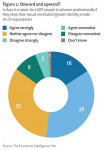Trade between Asia and the West will shrink by 4% in 2009 says new Economist Intelligence Unit report
For most Asian countries these are worrying times. High levels of trade dependency mean that many nations are highly vulnerable to economic upheaval elsewhere. The US and Europe are in a recession, set off by the global financial crisis, and the ripples are already being felt around the world. As if this weren't enough, 2008 has been a white-knuckle ride for Asian economies for another reason. The past year has seen unimagined oil price volatility, with the price of West Texas Intermediate, a type of crude oil, spiking at almost US$150 a barrel in July 2008.
This research examines the impact of national incomes and oil prices on international trade flows. Analysis shows that Asia is vulnerable, with the overall value of trade with the West set to shrink by over 4% in 2009, before recovering modestly in 2010. Key findings include:
· If the combined GDP of two countries increases, so does the value of trade between them.
In a bilateral trade relationship, a 1% increase in the combined income of the two countries boosts the value of trade between those countries, on average, by 1.3% over the next five years. It doesn't matter if one country's income grows, while the other's stays flat, as long as the combined income of the two nations rises.
· A 1% increase in the price of oil leads to a 0.24% reduction in trade. The Economist intelligence Unit estimates that a 1% increase in the price of oil leads to a 0.24% reduction in trade. This assumes that all other drivers, such as income levels in the two countries, remain constant.
· High oil prices have the greatest effect on South-east Asia, where trade decreases the most.
Where one end of a trading relationship is a South-east Asian country and the other is a nation in the EU or North America, the impact of oil prices is much greater. A 1% increase in the price of oil reduces the value of trade by 0.3% over five years. In other words, if oil prices double—as in 2008—then the value of trade between ASEAN and the West would fall by 30% over five years (assuming no rise in income levels).
· Global trade growth will slow substantially before recovering between 2010 and 2012.
When analysing the impact of changing income (or GDP) levels and the effect of high oil prices across a sample of 39 countries spread across the world, it is clear that growth in the value of trade will dip substantially in 2009 and 2010, before recovering in 2011 and 2012. Trade between Asia and the west will be hit hard, shrinking in 2009 and recovering only modestly in 2010.
· The most prolonged dip in trade is between North America and the EU. The most worrying picture emerges when examining trade flows between North America and the EU. Given the poor economic outlook, the value of trade between these two regions will contract in both 2009 and 2010, resuming growth only in 2011.
* To see the full report, please go to www.eiu.com/sponsor/dhl/fuellingtrade
About the Economist Intelligence Unit
The Economist Intelligence Unit is the world leader in global business intelligence. It is the business-to-business arm of The Economist Group, which publishes The Economist newspaper. The Economist Intelligence Unit provides geopolitical, economic and business analysis on more than 200 countries, as well as strategic intelligence on key industries and management practices. With over 300 full-time professionals in 40 offices around the world, supported by a global network of more than 700 contributing analysts, the Economist Intelligence Unit is widely known for its unparalleled coverage of major and emerging markets.
웹사이트: http://www.eiu.com
연락처
Joanne McKenna
Press Liaison
Economist Intelligence Unit
26 Red Lion Square
London
WC1R 4HQ
UK
Direct: +44 (0) 20 7576 8188
Sales: +44 (0) 20 7576 8181
Switchboard: +44 (0) 20 7576 8000
email: 이메일 보내기
이 보도자료는 Economist Intelligence Unit가(이) 작성해 뉴스와이어 서비스를 통해 배포한 뉴스입니다. 뉴스와이어는 편집 가이드라인을 준수합니다.




